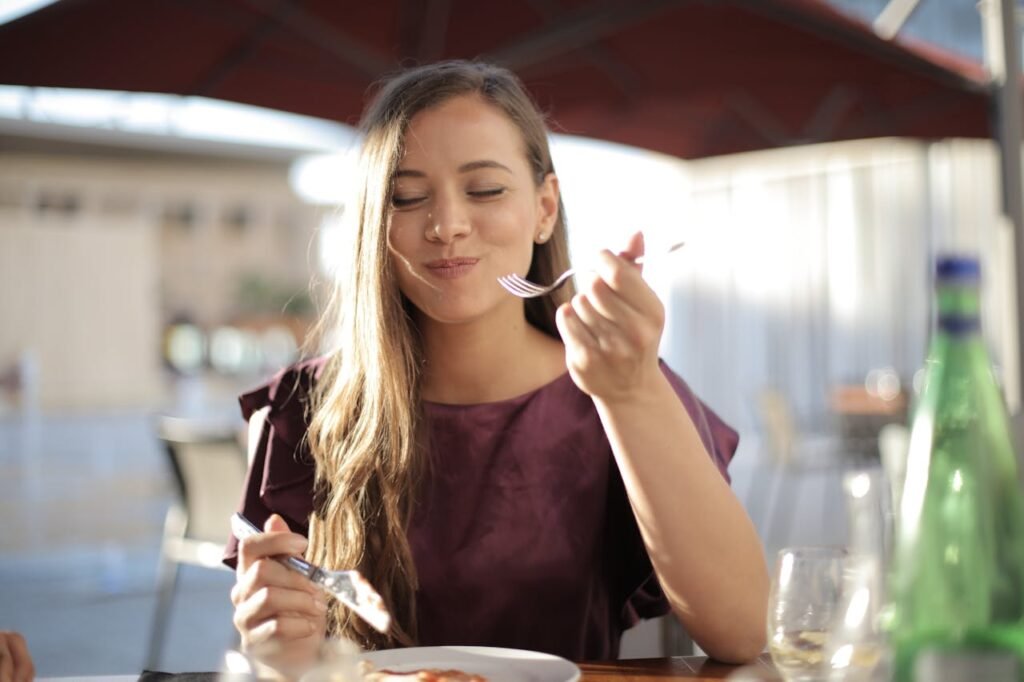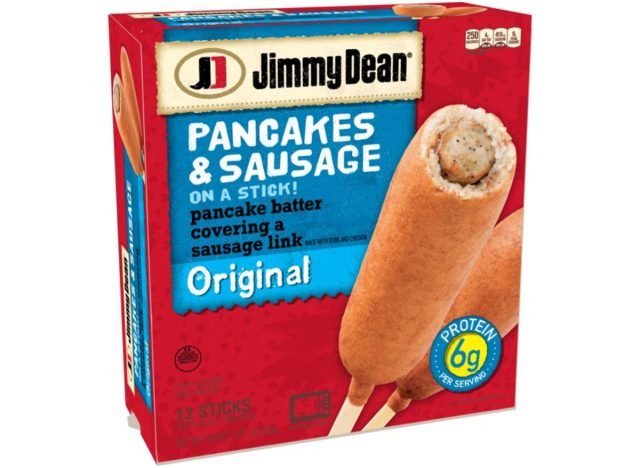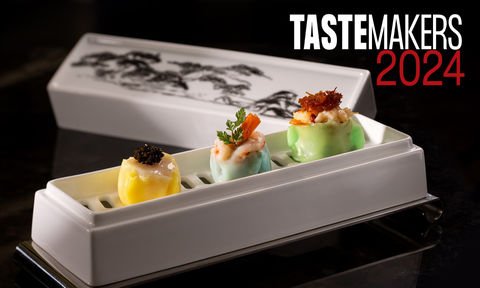He’s known for his devotion to healthy eating and favouring organic fruits and vegetables.
And they’re not the only food quirks that King Charles, 75, adheres to, with the monarch following a specific diet for much of his life.
For years, the father-of-two famously ate a light breakfast, skipped lunch and had his one main meal in the evenings, considering the middle meal a ‘luxury’ incompatible with his busy schedule.
Now, on the orders of his wife, aides and doctors, he has grudgingly started eating in the middle of the day to keep his strength up following his cancer diagnosis, the Mail on Sunday exclusively revealed.
His former press secretary Julian Payne previously said: ‘The King doesn’t eat lunch; so, an early lesson I learnt when out on the road with him was to have a big breakfast or bring a few snack bars with you to keep you going.

King Charles is known for his love of healthy eating and, up until recently, skipping lunch, claiming the middle meal is a luxury
‘The working day is pretty relentless. Beginning with the radio news headlines and a breakfast of seasonal fruit salad and seeds with tea.’
His only break from his relentless schedule is taken at around 1pm not to eat but to get outside to walk.
‘The King dislikes being inside for too long and always has the windows wide open,’ Mr Payne added.
Following his cancer diagnosis, the 75-year-old has had to change his eating schedule, but in true Charles fashion, his lunchtime of choice is one the healthiest snacks out there – avocado.
A source said: ‘With some reluctance, he now has something to eat at lunchtime – a snack, really. He now eats half an avocado to sustain him through the day. It’s important, particularly if you have got an illness.’
Charles is a healthy eater, insisting on organic produce. Eggs are a particular favourite. He told the BBC three years ago how he abstains from meat and fish on two days of the week and that he also avoids dairy on one of those days.
While Charles favours a light meal to start the day, his breakfast choice once put him under the spotlight.
In his 2006 book On Royalty, Jeremy Paxman claimed that Charles demanded seven eggs to be boiled for him a day – only eating one to make sure it was cooked to perfection.

The monarch (seen in August) has started eating a light lunch to keep his energy levels up following his cancer diagnosis

Pictured: King Charles in 2023 at the launch of The Coronation Food Project, which aims to bridge the gap between food waste and food need across all four nations of the United Kingdom
He wrote: ‘Because [Charles’] staff were never quite sure whether the egg would be precisely to the satisfactory hardness, a series of eggs was cooked, and laid out in an ascending row of numbers.’
Charles was forced to hit back at the claims in the Frequently Asked Questions section of the Clarence House website, with one reading: ‘Does The Prince of Wales have seven boiled eggs cooked for his breakfast but only eat one, as claimed in Jeremy Paxman’s book On Royalty?’
The royal reply said: ‘No, he doesn’t and never has done, at breakfast or any other time.’
As a devotee of fresh produce, he launched his food brand, Duchy Originals, in 1990, which now runs as Waitrose Duchy Organic.
In 2017, Prince Charles warned that the ‘very future of humanity’ may depend on organic farming.
Speaking at the 70th anniversary of the Soil Association in London in 2017, the heir to the throne insisted that eco-friendly practices, which had once seemed so controversial, were now backed by ‘sound science’.

The 75-year-old (seen in 2008) has long favoured organic produce and has been the patron of the Soil Association since 1999

Pictured: King Charles and Queen Camilla taking a tour during the launch of the Coronation Food Project in 2023
And he warned that they may be our only hope of reversing the drastic damage being caused to the environment, which could see large swathes of farmland destroyed forever ‘within sixty harvests’.
Charles, who has long practised organic farming himself as well as being an advocate of it, addressed the audience.
He said: ‘So Ladies and Gentlemen, it is becoming ever clearer that the very future of humanity may depend to a very large extent on a mainstream transition to more sustainable farming practices, based of course on organic principles.
‘Yet despite the extraordinary efforts of the Soil Association….things have actually got worse, not better, with the majority of farmland still in so-called conventional production, and the organic market still small and relatively fragile.
‘For instance, the impact of chemical fertilizers and pesticides on the soil biome, mirrored in our own stomachs as a result of excessive use of antibiotics, has been so devastating, that it is now being said that we only have enough fertility left for sixty harvests.’
Charles said his own road to becoming an organic farmer started at the beginning of the 1980s when he decided to find a way of producing food at his Gloucestershire estate outside of ‘conventional, industrialised’ agricultural practices.
He told his audience, which included gardener Monty Don: ‘The fact that I and others could take these steps, controversial though they seemed to some people at the time, was because of the pioneering work of the founder members of the Soil Association almost forty years earlier.
‘I expect you can imagine that when I first suggested organic farming should be taken seriously and, at the same time, rather cautiously managed to convert 40 acres of the Duchy Home Farm at Highgrove in 1985 – followed shortly after with the rest of the acreage at Home Farm – not everyone was entirely comfortable with the decisions I had taken.
‘However, we must remain ever mindful that despite seventy years of endeavour, change is not happening fast enough.
‘One thing is absolutely clear, against this uncertain external backdrop, exacerbated by the ever present threat of irreversible climate change, the role of the Soil Association is more important than ever, so while much has been achieved in 70 years, the hard work must continue. ‘
The Soil Association was founded in 1946 by farmers, scientists, doctors and nutritionists to promote the connection between the health of the soil, good, animals, people and environment. Charles has been patron of the organisation since 1999.

According to the a former royal chef, one of Charles’s (seen in 2018) favourite meals is lamb with mushroom risotto

Charles adheres to strict rules when it comes to tea, with staff checking the temperature of his brew with a thermometer
While the monarch now favours the much-loved avocado – his liked foods haven’t always been the trendiest of dishes, including pigweed.
It’s one of a handful of unusual and unfashionable long-lost foods from ancient times that could help solve the problem of how to feed the world’s booming population, according to the monarch.
In 2017, the then-Prince of Wales launched a campaign called the Forgotten Foods network dedicated to finding more exotic superfoods to feed millions and beat global warming.
Some of these ancient foods are already becoming more popular, with Malaysian organisation Crops of the Future finding creative ways to cook with the unusual ingredients.
More elaborate dishes included dragon fruit tortellini with turmeric yoghurt and mint oil.
Meanwhile Aztec pigweed can be used to make soups, burgers and can even replace rice.
And Charles also would likely raise some eyebrows with his tea habits, after a member of Charles’ hospitality staff revealed the royal has a strong opinion on what makes the perfect cuppa.
Hospitality manager at the 2,000-acre stately home, Evan Samson, 27, told The Times, that while sugar or organic honey can be added before you pour – milk should only ever be added last before taking out the teabag.
Offering a detailed description, the hospitality manager said tea must be heated to 100°C for Earl Grey or English breakfast and then measured with a thermometer to ensure accuracy.
He revealed Charles also has specifications on how the drink should be presented, expecting the handle of the teacup to be ‘placed to the right, with the teaspoon under the handle.’
In addition, staff must present a jug of milk in case guests want to top up their cuppa, which is a special brew supplied to the royal household by tea giant Twinings.

Pictured: Charles meeting staff and suppliers at Morrisons Supermarkets headquarters during a two-day tour of Yorkshire in 2022
In a 2020 video for online food platform Delish, British-born cook Darren McGrady, who now lives in Texas, revealed further insight into Charles’s eating habits.
McGrady, who worked for Princess Diana in the mid-1990s, said: ‘When it comes to eating no two days are the same for the Prince of Wales.
‘He often starts the day with fruit, sometimes skips lunch and has afternoon tea of boiled eggs and something more substantial in the evening.’
His favourite meal is lamb with mushroom risotto, Darren revealed. ‘I cooked lamb a lot at Buckingham Palace’ he explained. ‘I really Prince Charles, he was a foodie, into organic farming before it was even invented.
‘He loves wild mushrooms and would take his chefs to Balmoral to show them where best mushrooms are. We brought back to Buckingham Palace and they were the most amazing porcini mushrooms.’
In the clip, Darren cooked Charles favourite recipe. He starts by seasoning a rack of lamb, and then heats up a hot pan of oil.
Next, he seared the lamb before cooking it in a sous-vide – which is when the meat is cooked in a plastic vacuum bag inside a bath of water.
While the lamb was cooking for an hour, Darren made the risotto. He began by putting a oil in a pan and then added arborio rice, which he then covers it in a homemade chicken broth.
Darren hung up his royal apron in 1997 after Princess Diana died, but says his time at Kensington Palace and Windsor Castle looms large in his memory.
Last week, the King’s food-critic stepson Tom Parker Bowles gave an insight into Charles’ economical approach to meals.
‘Everything is recycled,’ he said. ‘If anything is left over, that will be made into something else or appear the next day. Nothing’s thrown out.’
His latest book, Cooking And The Crown, details the history of food in the royal family.
He revealed that in colder months, his mother Queen Camilla has porridge every day and keeps her lunches light – chicken broth or smoked salmon – while Charles eats dried fruit and honey for breakfast and has preferred afternoon tea to lunch.
Mr Parker Bowles said: ‘Tea has always been a spectacle – and an important and substantial meal in itself – for the royals. Everyone congregates for tea.
‘And it’s not just cakes and biscuits and crumpets and sandwiches. You might even get poached eggs.
‘If you are staying in Scotland, it’s quite dangerous, because you have a cooked breakfast, you have lunch, you have tea and you have dinner.’
‘He eats them only for utilitarian purposes.’


















